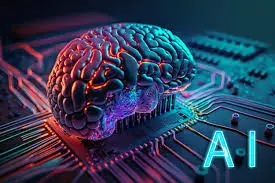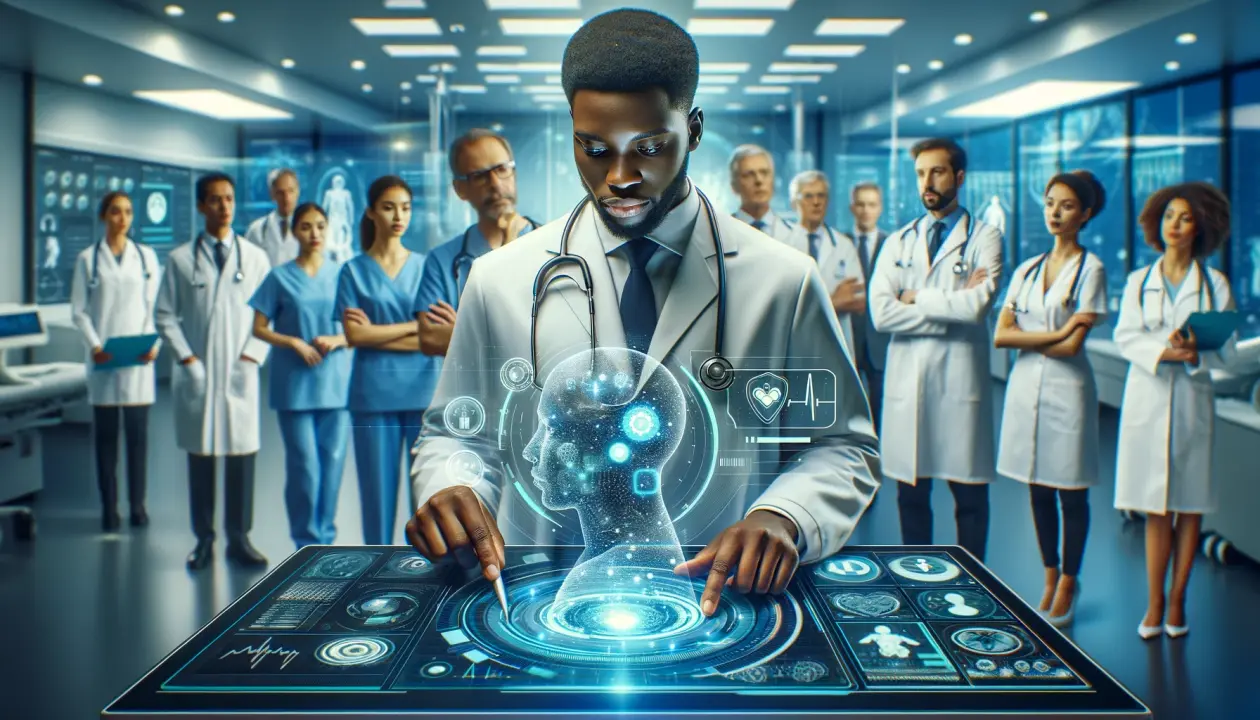Artificial Intelligence the future of (AI) is no longer just a futuristic concept from science fiction; it is a reality that is rapidly reshaping industries and everyday life. From healthcare and finance to transportation and entertainment, AI’s transformative power is being felt across the globe. This article explores the profound impact of AI on various sectors and its implications for our daily lives, looking ahead to what the future might hold.
Understanding AI: A Brief Overview
AI refers to the simulation of human intelligence processes by machines, particularly computer systems. These processes include learning, reasoning, problem-solving, perception, and language understanding. Machine Learning (ML), a subset of AI, involves the development of algorithms that allow computers to learn and make decisions based on data. Deep Learning, a further subset of ML, uses neural networks with many layers to analyze various factors of data.
Historical Context
The concept of AI dates back to ancient mythology and fiction, but it became a formal scientific pursuit in the mid-20th century. Alan Turing, a pioneer in computer science, posed the question, “Can machines think?” in 1950. This led to the development of the Turing Test, a method of determining a machine’s ability to exhibit intelligent behavior equivalent to that of a human.
Since then, AI has evolved through several phases, from rule-based systems in the 1950s and 1960s to the development of machine learning algorithms in the 1980s and the rise of deep learning in the 2000s. Today’s AI systems are capable of performing tasks that were once thought to be the exclusive domain of humans.
AI in Healthcare: Revolutionizing Patient Care
One of the most promising and impactful applications of AI is in healthcare. AI technologies are being used to improve diagnostics, personalize treatment plans, and enhance patient care in unprecedented ways.
Diagnostic Accuracy
AI algorithms can analyze medical data with remarkable accuracy, often surpassing human doctors in diagnosing certain conditions. For instance, AI systems have been developed to read radiology images and detect abnormalities such as tumors or fractures. These systems can process vast amounts of data quickly and identify patterns that might be missed by human eyes.
Personalized Medicine
Personalized medicine tailors treatment plans to the individual characteristics of each patient. AI plays a crucial role in this by analyzing genetic information, medical histories, and other relevant data to predict how a patient will respond to different treatments. This allows for more effective and targeted therapies, reducing the trial-and-error approach often associated with medical treatment.
Telemedicine and Virtual Health Assistants
The rise of telemedicine, accelerated by the COVID-19 pandemic, has been supported by AI-driven technologies. Virtual health assistants, powered by AI, can provide patients with medical advice, monitor symptoms, and schedule appointments. These systems enhance accessibility to healthcare, especially for those in remote or underserved areas.
AI in Finance: Enhancing Efficiency and Security
The financial industry has been quick to adopt AI technologies to streamline operations, manage risks, and enhance customer service. AI-driven tools are transforming the way financial institutions operate and interact with customers.
Fraud Detection
AI algorithms are highly effective in detecting fraudulent activities by analyzing transaction patterns and identifying anomalies. These systems can process large volumes of data in real-time, allowing for quicker detection and prevention of fraud. This not only protects consumers but also saves financial institutions billions of dollars annually.
Algorithmic Trading
Algorithmic trading uses AI to execute trades at optimal times based on complex algorithms that analyze market data and trends. These systems can make split-second decisions that would be impossible for human traders, leading to increased efficiency and profitability in the financial markets.
Personalized Banking
AI is also enhancing customer experiences through personalized banking services. Chatbots and virtual assistants provide customers with instant support and financial advice, improving customer satisfaction. AI-driven analytics help banks understand customer behavior and preferences, enabling them to offer tailored products and services.
AI in Transportation: Driving the Future
The transportation industry is undergoing a significant transformation driven by AI technologies. From autonomous vehicles to intelligent traffic management systems, AI is poised to revolutionize how we move people and goods.
Autonomous Vehicles
Self-driving cars are perhaps the most well-known application of AI in transportation. Companies like Tesla, Waymo, and Uber are developing autonomous vehicles that use AI to navigate roads, avoid obstacles, and make real-time decisions. These vehicles have the potential to reduce accidents caused by human error and increase the efficiency of transportation systems.
Traffic Management
AI-driven traffic management systems analyze data from various sources, such as traffic cameras and sensors, to optimize traffic flow and reduce congestion. These systems can adjust traffic signals in real-time, provide route recommendations, and even predict traffic patterns based on historical data.
Predictive Maintenance
In the logistics and transportation sector, AI is used for predictive maintenance of vehicles and infrastructure. By analyzing data from sensors and other sources, AI systems can predict when a vehicle or piece of equipment is likely to fail and schedule maintenance before a breakdown occurs. This reduces downtime and maintenance costs while improving reliability.
AI in Entertainment: Creating New Experiences
The entertainment industry is leveraging AI to create more immersive and personalized experiences for consumers. From content creation to recommendation systems, AI is changing the way we consume and interact with entertainment.
Content Creation
AI is being used to create music, art, and even entire movies. For example, AI algorithms can compose music that mimics the style of famous composers or generate artwork that is indistinguishable from pieces created by humans. In the film industry, AI is used to create realistic special effects and even generate scripts.
Personalized Recommendations
Streaming services like Netflix and Spotify use AI to analyze user behavior and preferences to recommend content. These recommendation systems are constantly learning and improving, providing users with personalized content that keeps them engaged.
Interactive Experiences
AI is also enhancing interactive entertainment experiences. Video game developers use AI to create more realistic and responsive non-player characters (NPCs). Virtual reality (VR) and augmented reality (AR) experiences are becoming more immersive thanks to AI-driven technologies that adapt to user interactions.
AI in Education: Enhancing Learning and Accessibility
AI has the potential to revolutionize education by providing personalized learning experiences, improving accessibility, and enhancing administrative efficiency.
Personalized Learning
AI-driven educational platforms can adapt to the learning style and pace of each student. These systems analyze student performance data to identify strengths and weaknesses and provide customized learning materials and activities. This personalized approach helps students learn more effectively and at their own pace.
Accessibility
AI technologies are making education more accessible to individuals with disabilities. For example, speech recognition and natural language processing (NLP) technologies can convert spoken language into text, aiding students with hearing impairments. Similarly, AI-driven tools can provide real-time translations, making education more accessible to non-native speakers.
Administrative Efficiency
AI is also streamlining administrative tasks in educational institutions. Chatbots and virtual assistants can handle routine inquiries from students and parents, freeing up staff to focus on more complex tasks. AI-driven analytics help administrators make data-driven decisions about resource allocation, curriculum development, and student support services.
AI in Everyday Life: Transforming How We Live
Beyond specific industries, AI is transforming everyday life in numerous ways. From smart homes to personal assistants, AI technologies are making our lives more convenient, efficient, and enjoyable.
Smart Homes
AI-powered smart home devices, such as thermostats, lighting systems, and security cameras, are becoming increasingly common. These devices can learn from user behavior and preferences to automate and optimize home environments. For example, a smart thermostat can learn a homeowner’s schedule and adjust the temperature accordingly, saving energy and improving comfort.
Personal Assistants
Virtual personal assistants like Amazon’s Alexa, Apple’s Siri, and Google Assistant use AI to perform a wide range of tasks, from setting reminders and answering questions to controlling smart home devices and providing personalized recommendations. These assistants are continually improving, becoming more capable and intuitive over time.
Health and Wellness
AI-driven wearable devices, such as fitness trackers and smartwatches, monitor various aspects of health and wellness, including physical activity, heart rate, sleep patterns, and more. These devices provide users with personalized insights and recommendations to improve their health and well-being.
The Ethical and Social Implications of AI
While the potential benefits of AI are immense, it is important to consider the ethical and social implications of these technologies. Issues such as privacy, bias, and job displacement must be addressed to ensure that AI is developed and used responsibly.
Privacy Concerns
AI systems often rely on large amounts of data to function effectively. This raises concerns about privacy and the potential misuse of personal information. It is crucial to implement robust data protection measures and ensure transparency in how data is collected, stored, and used.
Bias and Fairness
AI algorithms can inadvertently perpetuate or even exacerbate existing biases present in the data they are trained on. This can lead to unfair outcomes in areas such as hiring, lending, and law enforcement. Efforts must be made to identify and mitigate biases in AI systems to ensure fairness and equity.
Job Displacement
The automation of tasks by AI has the potential to displace jobs across various industries. While AI can create new opportunities and improve productivity, it is important to consider the impact on workers and develop strategies to support those affected by job displacement, such as reskilling and education programs.
The Future of AI : Opportunities and Challenges
The future of AI holds tremendous promise, but it also presents significant challenges. As AI technologies continue to evolve, it is essential to navigate these challenges to realize the full potential of AI.
Advancements in AI Technologies
Ongoing research and development in AI are likely to lead to new breakthroughs and applications. Advancements in areas such as quantum computing, natural language processing, and reinforcement learning will further enhance the capabilities of AI systems.
Collaboration and Regulation
Collaboration between governments, industry, academia, and civil society is crucial to ensure that AI is developed and used responsibly. Developing regulatory frameworks and ethical guidelines will help address the challenges associated with AI and promote its beneficial use.
Education and Workforce Development
Preparing the workforce for the AI-driven future is essential. This includes providing education and training in AI-related fields and promoting lifelong learning to help individuals adapt to changing job requirements.
The transformative power of AI is already being felt across various industries and aspects of everyday life. As AI technologies continue to advance, they have the potential to bring about even more profound changes. However, it is important to navigate the ethical and social implications of AI and ensure that it is developed and used responsibly. By doing so, we can harness the full potential of AI to create a better future for all.

